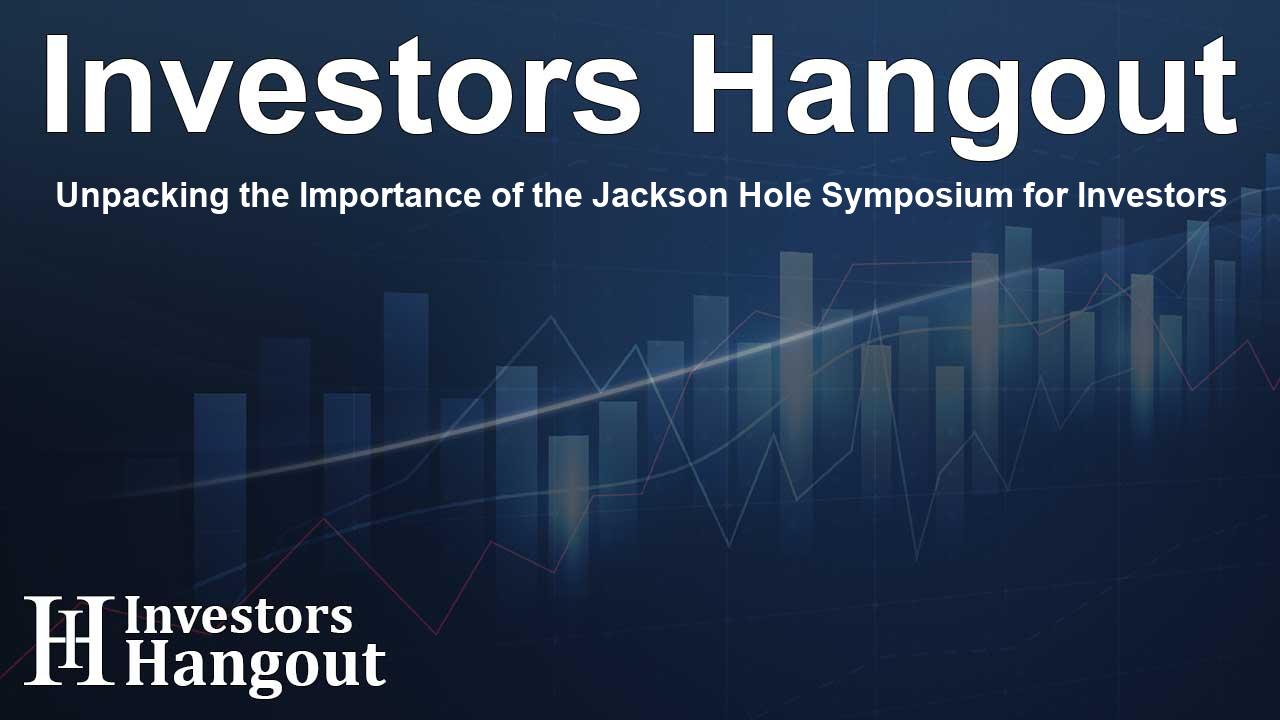Unpacking the Importance of the Jackson Hole Symposium for Investors

Understanding the Significance of the Jackson Hole Symposium
Picture yourself in the shoes of Jerome Powell, the Federal Reserve chairman, standing before a captivated audience at the renowned Jackson Hole Economic Policy Symposium. This annual gathering, known for its influential discussions on monetary policy, is not just another event; it’s a pivotal moment where critical decisions are pondered in the majestic backdrop of Wyoming.
Political Pressures Surrounding the Event
In the lead-up to the symposium, Powell finds himself under immense pressure from various fronts. There are calls from political figures advocating for interest rate cuts, emphasizing the need for monetary easing to spur economic growth. Simultaneously, questions regarding the Federal Reserve's independence ring loudly from Congress, creating an environment rife with tension.
Conflict with the Administration
The current political landscape only adds to the strain, as alliances within government stir discussions about Powell's potential successors. There’s even a promise of a favored replacement who advocates for aggressive rate reductions, adding to the uncertainty surrounding Powell's future decisions.
Historical Overview of Jackson Hole
Established in 1978 as a modest conference focused on agricultural economics, Jackson Hole has evolved into a prestigious venue for central bankers and economists. The transition to this beautiful location was a strategic move to attract key figures like Paul Volcker, who was an enthusiastic angler enjoying the serene surroundings better than the hustle of city life.
This shift not only increased the symposium's stature but also allowed attendees to engage in more meaningful discussions, free from the distractions that typically plague urban centers. Over the years, the Kansas City Fed has solidified Jackson Hole as a lasting tradition intertwined with global monetary policy.
Defining Moments in Monetary Policy
The symposium has historically served as a stage for monumental shifts in monetary policy. For instance, Raghuram Rajan, an economist from the IMF, delivered a stark warning in 2005 about the underestimation of risks tied to sophisticated financial instruments. This prescient address hinted at impending troubles that would culminate in the 2008 financial crisis.
Reflecting on more recent history, Ben Bernanke initiated the first quantitative easing program in 2008 at this very platform, aiming to stabilize markets following the collapse. Janet Yellen continued this legacy, emphasizing the resilience of the financial system developed in the wake of previous crises.
Why Jackson Hole is More Relevant Than Ever
The importance of Jackson Hole goes beyond mere theoretical discussions. The outcomes can produce ripples across global markets, affecting everything from bond yields to currency valuations. Investors are acutely aware of the potential impact of remarks made during this symposium, often reacting quickly to the insights they glean from Powell and his counterparts.
For example, Powell's sentiments on inflation and necessary actions can have immediate consequences, as witnessed in 2022 when the market reacted sharply to his outlook regarding household and business challenges. Historical patterns indicate that fluctuations are common following these significant speeches.
The Current Economic Landscape
This year, the anticipation surrounding Powell's remarks is particularly heightened. With stubborn inflation figures and ongoing speculation about the Fed's independence under political influences, both private equity and credit markets are keenly attuned to what might unfold. Investors are hoping for clarity regarding foreseeable rate adjustments as deal-making momentum hangs in the balance.
Ultimately, whether Powell opts to reassure the markets or tread cautiously, his address at Jackson Hole will be meticulously analyzed by stakeholders everywhere — reaffirming the symposium's role as a crucial platform for understanding monetary policy trajectories.
Frequently Asked Questions
What is the Jackson Hole Economic Policy Symposium?
The Jackson Hole symposium is an annual gathering of central bankers and economists to discuss crucial monetary policy issues, typically held in Wyoming.
Why is it important for the Federal Reserve?
This event allows the Federal Reserve to communicate potential policy directions and engage in deeper discussions away from political pressures and media scrutiny.
How have past speeches impacted market conditions?
Historical speeches at Jackson Hole have led to immediate market reactions, influencing everything from interest rates to stock prices based on comments made by central bankers.
Who typically attends the symposium?
Attendees usually include central bankers, economists, policymakers, and prominent financial figures from around the world, fostering debates on economic strategies.
What challenges does Jerome Powell face currently?
This year, Powell's primary challenges include navigating political pressures, addressing persistent inflation, and maintaining the integrity of Fed independence.
About The Author
Contact Caleb Price privately here. Or send an email with ATTN: Caleb Price as the subject to contact@investorshangout.com.
About Investors Hangout
Investors Hangout is a leading online stock forum for financial discussion and learning, offering a wide range of free tools and resources. It draws in traders of all levels, who exchange market knowledge, investigate trading tactics, and keep an eye on industry developments in real time. Featuring financial articles, stock message boards, quotes, charts, company profiles, and live news updates. Through cooperative learning and a wealth of informational resources, it helps users from novices creating their first portfolios to experts honing their techniques. Join Investors Hangout today: https://investorshangout.com/
The content of this article is based on factual, publicly available information and does not represent legal, financial, or investment advice. Investors Hangout does not offer financial advice, and the author is not a licensed financial advisor. Consult a qualified advisor before making any financial or investment decisions based on this article. This article should not be considered advice to purchase, sell, or hold any securities or other investments. If any of the material provided here is inaccurate, please contact us for corrections.
